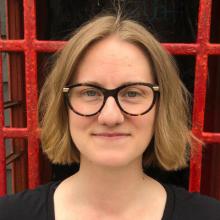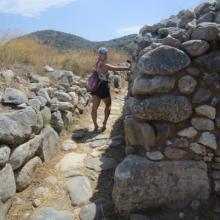Drea Brake
What are your main responsibilities or activities in your current position?
My primary responsibility as an Academic Coordinator is scheduling all the courses for the university. This involves working with faculty, department chairs, and the rest of the Academic Affairs team to match faculty with courses, and to ensure that we offer the courses our students need. As a faculty member, my primary responsibility is to deliver the course content in an engaging way, and work with students to improve their knowledge, skills, and abilities so that they can succeed in whatever they pursue in life beyond higher education.
How does your current work relate to your graduate degree?
The most direct connection between my graduate degree and my current work is in my role as a sessional faculty. As a graduate student at UBC I had the pleasure of working as a Teaching Assistant (TA) during two terms. This experience prepared me well for teaching my own course - both in terms of presenting course content and in managing the classroom environment. My time as a graduate student at UBC also prepared me well for my work as an Academic Coordinator. Graduate school can be an enlightening, busy, and overwhelming experience. In grad school, I learned (among other things) the importance of boundaries, between work and personal life, and have found that lesson most helpful in my current position.
What do you like and what do you find challenging about your current position?
The most challenging (and often most rewarding) part of my current position as Academic Coordinator is putting all the pieces of the scheduling puzzle together in a way that works the best for the most people. The most challenging part about my work as a faculty member (and definitely the part I enjoy the most) is finding a way light that spark in my students--the one that opens their eyes to the possibilities before them and jump-starts their own internal motivation towards pursuing knowledge and understanding.
Is your current career path as you originally intended?
Definitely not. Over the past 20 years I have aimed for, or had the opportunity to pursue, many different career paths. Some felt right at the time, but didn't work out the way I'd imagined. Others offered many opportunities, but it turned out I had little interest in them. I'm very happy where I am at the moment, and I know that my path will likely take me to more unexpected (and wonderful) places in the future.
What motivated you to pursue graduate work at UBC?
One of the things I have known for some time is that I greatly enjoy teaching. In my mid-20s I also developed a fascination for the world of the ancient Mediterranean. What drove me to pursue my graduate studies at UBC was the dream of combining these two interests and working towards a career as a university instructor, and a desire to study at one of the top institutions in the world.
What did you enjoy the most about your time as a graduate student at UBC?
The faculty, staff, and fellow graduate students in the CNERS department were by far the best thing about my time at UBC. I found in them an incredible and supportive community, which, I think, made all the difference in my graduate school experience.
What key things did you do, or what attitudes or approaches did you have, that contributed to your success?
I struggle with anxiety, and during my time at UBC I developed a daily yoga practice. I have experienced so many benefits from my ongoing daily practice, and while I know this specific tool may not be for everyone, I think that my efforts to focus on my own mental health and well-being was one of the best things I did for myself in graduate school.
What is your best piece of advice for current graduate students preparing for their future careers?
Breathe. Life is long, and you will likely end up going in some unexpected directions. Breathe, and enjoy where you are and what you are doing right now, because it will pass. Breathe, and fill each day with things that you enjoy, because you never know where you will end up in the future.
Did you have any breaks in your education?
I had many breaks in my education, most of which weren't really planned. For a long time I viewed them as a hinderance, and often looked with some jealousy upon my younger colleagues, who would complete their journey younger than I was when I began mine. I now realize, however, that these breaks, and the years of experience I gained in them, served to give me both more focus and stronger motivation than I would have had if I had pursued graduate school in my early 20s. These breaks gave me the opportunity to gain experience in diverse fields, often unrelated to what I've ended up pursuing, and also gave me time to reflect on what is important to me, and what kind of life I want to live.
How did you find out about/obtain your current position?
I learned about my current position through the indeed jobs website.
What challenges did you face in your graduate degree, or in launching your career?
I think that, more than anything, I may have stood in my own way sometimes. I am very driven, and incredibly impatient once I know what I want and where I want to go. Throughout my graduate studies, and the subsequent job searches, I've learned a lot about patience (and still have much more to learn). I don't think I would have done anything differently. Years ago I determined that I would live without regret. Everything that has happened, everything I did (or didn't do), brought me to where I am now--and I am so grateful to be here.
How are jobs normally posted and filled in your organization or industry?
University Canada West posts job availabilities on a number of websites, including Indeed and the university's own Career's page.

